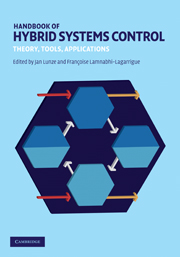14 - Industrial controls
from Part III - Applications
Published online by Cambridge University Press: 21 February 2011
Summary
In this chapter, several applications of hybrid systems theory to benchmark process control problems are described, ranging from logic controller verification for an evaporation system to controller synthesis and optimization-based control of multiproduct batch plants and refrigerator systems.
Introduction to process control applications
While continuous feedback and feedforward control is certainly crucial for the safe, economic, and ecologically benign operation of processing plants of all kinds, the dominant part of the control software for such plants handles and generates signals and events that are discrete in nature. Logic controllers supervise and filter all inputs by the operators for their admissibility, trigger process alarms and partial or complete shut-downs, and switch between control configurations. Sequential controllers govern the start-up of devices, such as pumps and compressors, and of complete units, and the execution of batch recipes as well as shut-down sequences. Even inside continuous controllers, a lot of discrete logic is present, sensors are monitored and their signals are replaced by substitute values in case of errors, the controllers are switched between different modes, anti-windup functions are realized, etc. Exception handling is a major part of all software modules of the control system.
The correct function and economic performance of a plant thus depends on the correct interaction between a vast number of logic and discrete control functions on different layers, the continuous dynamics of the plant, and the continuous or quasicontinuous controllers.
- Type
- Chapter
- Information
- Handbook of Hybrid Systems ControlTheory, Tools, Applications, pp. 405 - 438Publisher: Cambridge University PressPrint publication year: 2009

